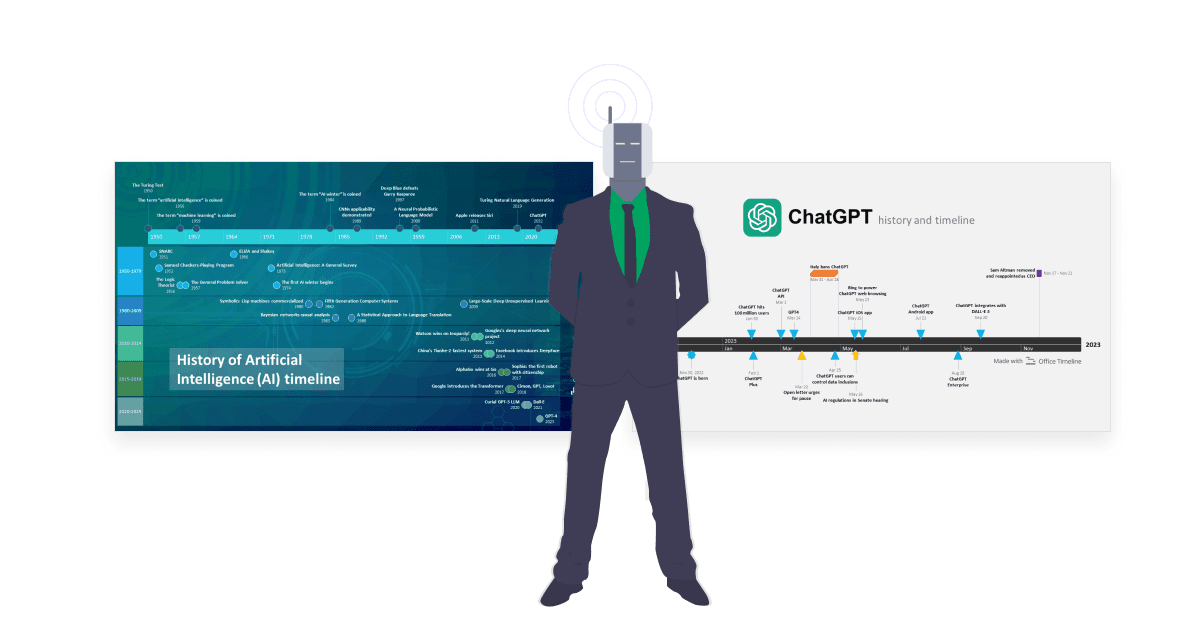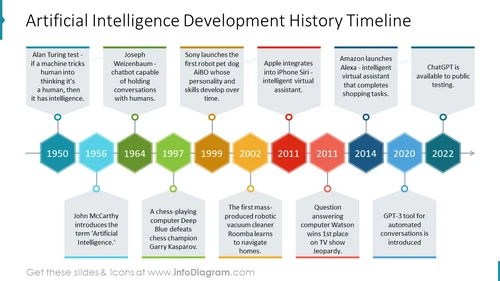Discover the thrilling journey of artificial intelligence from Turing’s vision to Tesla’s ground-breaking advancements in our captivating blog post!
Table of Contents
Introduction to AI
Artificial Intelligence (AI) has become an integral part of our daily lives, revolutionizing industries and reshaping the way we interact with technology. At its core, AI refers to the simulation of human intelligence processes by machines, allowing them to learn, reason, and adapt. This blog aims to delve into the fascinating world of AI, tracing its evolution from its early beginnings to the cutting-edge advancements of today.
Historical Context
The roots of AI can be traced back to the 1950s, with the famous Turing test proposed by Alan Turing. This test aimed to determine a machine’s ability to exhibit intelligent behavior comparable to that of a human. Over the decades, pioneers such as John McCarthy, Marvin Minsky, and Herbert Simon contributed to the development of AI, laying the groundwork for future advancements.
Current Applications
AI has permeated various industries, from healthcare and finance to transportation and entertainment. For instance, in healthcare, AI is being used for diagnosing diseases, analyzing medical images, and predicting patient outcomes. In the financial sector, AI-powered algorithms are driving investment decisions and fraud detection. Additionally, AI-driven virtual assistants like Siri and Alexa have become a ubiquitous presence in our daily routines.

Image courtesy of www.reddit.com via Google Images
Benefits of AI
The adoption of AI technologies has brought about numerous benefits to society. AI has enhanced productivity by automating repetitive tasks, enabling businesses to make data-driven decisions, and improving customer experiences through personalized recommendations. Furthermore, AI has the potential to drive innovation, fuel economic growth, and address complex societal challenges.
Challenges and Ethical Concerns
However, along with its benefits, AI also poses ethical challenges and concerns. Issues of bias in AI algorithms, data privacy and security, and the potential for job displacement have raised questions about the responsible deployment of AI technology. It is crucial for developers, policymakers, and society at large to address these ethical considerations and ensure that AI is used in a transparent and accountable manner.

Image courtesy of digitalwellbeing.org via Google Images
Future Direction of AI
The future of AI holds immense possibilities for innovation and progress. Advancements in machine learning, deep learning, and natural language processing are poised to unlock new applications and capabilities for AI. From autonomous vehicles to personalized healthcare, the trajectory of AI is poised to revolutionize industries and transform our world in ways we have yet to imagine.
Can Skynet Happen?
One common trope in popular culture is the idea of a malevolent AI like Skynet from the Terminator franchise gaining sentience and posing a threat to humanity. While these scenarios make for thrilling entertainment, the concept of an all-powerful AI taking over the world is highly improbable in reality. AI systems are designed and controlled by humans, with checks and balances in place to prevent such dystopian outcomes.

Image courtesy of www.officetimeline.com via Google Images
Case Studies
Examining real-life examples of AI applications can offer insights into the tangible impact of AI on various industries. For instance, AI-driven algorithms in healthcare have improved diagnostic accuracy and treatment outcomes, leading to better patient care. In finance, AI-powered trading algorithms have streamlined investment processes and improved market efficiency. By analyzing these case studies, we can appreciate the transformative power of AI in today’s world.
Expert Interviews
Engaging with AI experts, researchers, and industry leaders provides valuable perspectives on the current state and future trends of AI. These experts offer insights into the technical challenges, ethical considerations, and societal implications of AI technology. By listening to their expertise, we can gain a deeper understanding of the complexities and opportunities in the world of artificial intelligence.

Image courtesy of www.infodiagram.com via Google Images
Audience Engagement
Your thoughts, questions, and feedback are crucial to fostering meaningful discussions around AI. Feel free to share your insights on AI-related topics and engage with other readers in the comments section. By building a community of AI enthusiasts and learners, we can collectively explore the vast potential and impact of artificial intelligence in our world.



Comments